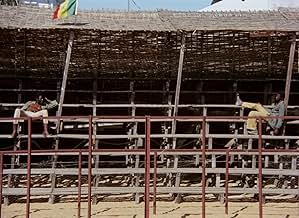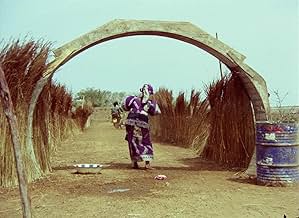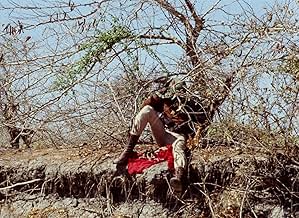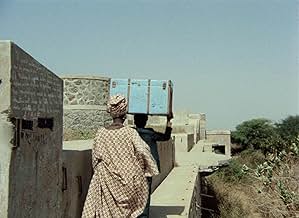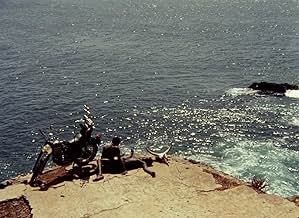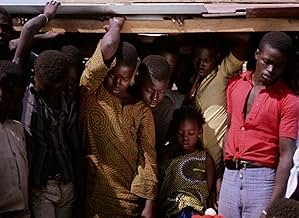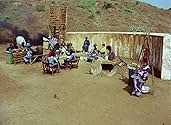IMDb RATING
7.0/10
4.5K
YOUR RATING
Mory, a cowherd, and Anta, a university student, try to make money in order to go to Paris and leave their boring past behind.Mory, a cowherd, and Anta, a university student, try to make money in order to go to Paris and leave their boring past behind.Mory, a cowherd, and Anta, a university student, try to make money in order to go to Paris and leave their boring past behind.
- Awards
- 2 wins & 1 nomination total
Myriam Niang
- Anta
- (as Mareme Niang)
Josephine Baker
- Joséphine Baker
- (voice)
- (as Joséphine Baker)
- Director
- Writer
- All cast & crew
- Production, box office & more at IMDbPro
Featured reviews
First, I didn't like the movie because I felt I wasn't able to enjoy it really. It made the impression of a TV documentary on how livestock is mistreated in Western Africa.
Then, by quite confusingly repeating a scene scored by somewhat mystical pop music, the film turned to the other extreme and made me consider it over-sybolistic.
Then, finally, the actual story began, and I could figure out various things. I could separate dream from reality, although this was not so easy, and I thought the film was too clichéd at some moments (e. g. the fat gay man, who was charming but a little camp).
Now that the film is over and I thought back to it I believe it is not at all a bad movie. Many discontinuities and an unusual narrative style are something we should welcome. Regarding the images and colours it is a wonderful piece of work. The film seems like brilliant illustration of an average story.
Then, by quite confusingly repeating a scene scored by somewhat mystical pop music, the film turned to the other extreme and made me consider it over-sybolistic.
Then, finally, the actual story began, and I could figure out various things. I could separate dream from reality, although this was not so easy, and I thought the film was too clichéd at some moments (e. g. the fat gay man, who was charming but a little camp).
Now that the film is over and I thought back to it I believe it is not at all a bad movie. Many discontinuities and an unusual narrative style are something we should welcome. Regarding the images and colours it is a wonderful piece of work. The film seems like brilliant illustration of an average story.
The story to this film is simple (maybe deceptively so), but it's told in an avant-garde way by Mambéty, and loaded with meaning. The premise is that a rebel and a university student have had enough of the traditional life in Dakar, and dream of escaping by ship to Paris. They get on his motorbike which is embellished with cow horns, and to the tune of Josephine Baker crooning "Paris, Paris," begin a series of misadventures on their way to the port.
The events that occur along the road trip, most involving theft or attempted theft, really aren't all that memorable, but the visuals that Mambéty and cinematographer Pap Samba Sow conjured up certainly were. Vibrant colors, rugged scenery, a photographer's eye for framing make for many gorgeous moments, pretty impressive for its limited budget. And yet, in stark contrast to the beauty in this land and its people, life is shown to be dirty, and a struggle. The film felt immersive into Senegal in a literal sense, but through its use of montages, fantasy, and misdirection, also immersive into the fractured mindset of its nonconformist protagonists.
Unfortunately, this immersion also includes some absolutely brutal scenes of animals being killed very early on - cattle in a slaughterhouse, as well as a goat out in a field. These go on for extended intervals, there is a lot of blood, and the animals are shown writhing in agony. Images from the slaughterhouse are reprised towards the end, giving it a larger point, that the young man is as trapped as those poor cows, which was a powerful moment, but I don't think the earlier scenes needed to have been as graphic as they were. It was nauseating to me, though admittedly my perspective is from a different culture, and one lucky enough to have the means to be vegetarian.
The film is made with artistry and style, but it's rooted in realism, and a reflection of the desire for a better life for the Senegalese. There isn't an overt argument made as to the devastating effects of colonialism that impoverished the country, but we do get a glimpse into the ugly attitudes of a French couple who have been teaching in Senegal for seven years, through this exchange:
"There's nothing to see in Senegal. Barren, intellectually as well." "Our salary is three times that of the Senegalese teachers, but they don't eat like we do. They're not as refined." "And what would we buy here? Masks? African art is a joke made up by journalists in need of copy."
Overall, despite its power and visual flair, I confess I admired this film more than I loved it. Aside from the animal slaughter (which may seriously turn you against the film on its own), the events on the road trip following that glorious scene on the flat rock with the sea churning below just weren't strong enough, and pacing was an issue. Worth seeing, just be prepared to avert your gaze in the beginning.
The events that occur along the road trip, most involving theft or attempted theft, really aren't all that memorable, but the visuals that Mambéty and cinematographer Pap Samba Sow conjured up certainly were. Vibrant colors, rugged scenery, a photographer's eye for framing make for many gorgeous moments, pretty impressive for its limited budget. And yet, in stark contrast to the beauty in this land and its people, life is shown to be dirty, and a struggle. The film felt immersive into Senegal in a literal sense, but through its use of montages, fantasy, and misdirection, also immersive into the fractured mindset of its nonconformist protagonists.
Unfortunately, this immersion also includes some absolutely brutal scenes of animals being killed very early on - cattle in a slaughterhouse, as well as a goat out in a field. These go on for extended intervals, there is a lot of blood, and the animals are shown writhing in agony. Images from the slaughterhouse are reprised towards the end, giving it a larger point, that the young man is as trapped as those poor cows, which was a powerful moment, but I don't think the earlier scenes needed to have been as graphic as they were. It was nauseating to me, though admittedly my perspective is from a different culture, and one lucky enough to have the means to be vegetarian.
The film is made with artistry and style, but it's rooted in realism, and a reflection of the desire for a better life for the Senegalese. There isn't an overt argument made as to the devastating effects of colonialism that impoverished the country, but we do get a glimpse into the ugly attitudes of a French couple who have been teaching in Senegal for seven years, through this exchange:
"There's nothing to see in Senegal. Barren, intellectually as well." "Our salary is three times that of the Senegalese teachers, but they don't eat like we do. They're not as refined." "And what would we buy here? Masks? African art is a joke made up by journalists in need of copy."
Overall, despite its power and visual flair, I confess I admired this film more than I loved it. Aside from the animal slaughter (which may seriously turn you against the film on its own), the events on the road trip following that glorious scene on the flat rock with the sea churning below just weren't strong enough, and pacing was an issue. Worth seeing, just be prepared to avert your gaze in the beginning.
I recently showed this film to a group of students so what follows is a condensed version of the worksheet I gave them. The questions I give hopefully can assist others in making meaning from the film.
Touki Bouki can best be made sense of in the following way: It operates through allusion and symbolism. Through the story of two young lovers, Mory and Fanta, clashing with the older generation, yearning to leave for Paris, Mambety puts on screen his vision of a country where the weight of thousands of years of tradition collides head on with the modernity of a newly emergent Senegal.
Allusion...an implied or indirect reference hinting at something
Symbol...something that stands for something else...something concrete that represents or suggests another thing that cannot in itself be represented or visualised...for example a lion symbolises courage
Think about what you have seen (and heard!) in the film, paying special attention to:
Mory's motorbike – what is it decorated with? What do those objects remind you of? Fanta ties it to a tree, in the midst of a herd of cows...is there a connection to the cows?
The long scene in the first half of the film, when there are lots of shots of the sea, then we see Mory and Fanta together on the cliffs talking about leaving for France
The transformation of the Aunt from an unsympathetic character in the first half of the film to a praise singer in the second.
Charlie's car which Mory and Fanta ride off in after robbing him is a Citroen painted in the flag of which country? How is it positioned in relation to the motorbike and the welcomers?
1. How do you think the following things are alluded to in the film?
The act of lovemaking The city of Paris The cycles of life – birth, death, birth
2. How do you think the following things are symbolised in the film?
African tradition African modernity – this film is made soon after Senegal gained independence The ties which hold us, such as family, friends, our familiar environment Colonial power The primitive
Other points to consider...
Mambety inserts documentary footage from actual events, such as the women at the well, a wrestling competition, street children and a Presidential motorcade, into a fiction film. Do these scenes have anything to do with the story? What effect do they have on you, the viewer? What's your response to them? Why might they be in the film?
Certain images and sounds are repeated in the film, such as the ocean, the crows, the cries of the taxi driver who runs away from the box then repeated by the caveman. What effect does this have? Does it 'organize' the film in any way?
Answers... Mory's motorbike symbolizes Africa, in the scene after they ve robbed Charlie, it s positioned in such a way against the Citroen that the two seem oppositional. The Citroen is a French car decorated with the US flag stars and stripes so representing both French colonialism and US imperialism. The sea is a symbol for lovemaking. The cycles of nature are implied in the scenes of cattle slaughter and goat being sacrificed. Fanta ties the motorbike up as if shes trying to hold at bay the forces of modernity, of change. is the film trying to reconcile two opposing aspects, yearning for the past and tradition while simultaneously embracing modernity, the new? Whose the weird, white looking caveman up in the tree? Its as if Mambety shoves our images of 'primitive' Africans back in faces, also in the dream sequence when Mory and Fanta sit in the car, dressed in 1930s clothes smoking, being sung praises by Aminata Fal is a parody of successful Europeans. There's so much I d love to write about this film...Paris is reduced to a notion, an idea, a fantasy, brought to life through a clichéd song by Josephine Baker. On another level I read Touki Bouki as being about how Europe positions Africa and Africa positions Europe as exotic other. I m running out of space here, loads I could write about this film, hope this is useful, ENJOY!
Touki Bouki can best be made sense of in the following way: It operates through allusion and symbolism. Through the story of two young lovers, Mory and Fanta, clashing with the older generation, yearning to leave for Paris, Mambety puts on screen his vision of a country where the weight of thousands of years of tradition collides head on with the modernity of a newly emergent Senegal.
Allusion...an implied or indirect reference hinting at something
Symbol...something that stands for something else...something concrete that represents or suggests another thing that cannot in itself be represented or visualised...for example a lion symbolises courage
Think about what you have seen (and heard!) in the film, paying special attention to:
Mory's motorbike – what is it decorated with? What do those objects remind you of? Fanta ties it to a tree, in the midst of a herd of cows...is there a connection to the cows?
The long scene in the first half of the film, when there are lots of shots of the sea, then we see Mory and Fanta together on the cliffs talking about leaving for France
The transformation of the Aunt from an unsympathetic character in the first half of the film to a praise singer in the second.
Charlie's car which Mory and Fanta ride off in after robbing him is a Citroen painted in the flag of which country? How is it positioned in relation to the motorbike and the welcomers?
1. How do you think the following things are alluded to in the film?
The act of lovemaking The city of Paris The cycles of life – birth, death, birth
2. How do you think the following things are symbolised in the film?
African tradition African modernity – this film is made soon after Senegal gained independence The ties which hold us, such as family, friends, our familiar environment Colonial power The primitive
Other points to consider...
Mambety inserts documentary footage from actual events, such as the women at the well, a wrestling competition, street children and a Presidential motorcade, into a fiction film. Do these scenes have anything to do with the story? What effect do they have on you, the viewer? What's your response to them? Why might they be in the film?
Certain images and sounds are repeated in the film, such as the ocean, the crows, the cries of the taxi driver who runs away from the box then repeated by the caveman. What effect does this have? Does it 'organize' the film in any way?
Answers... Mory's motorbike symbolizes Africa, in the scene after they ve robbed Charlie, it s positioned in such a way against the Citroen that the two seem oppositional. The Citroen is a French car decorated with the US flag stars and stripes so representing both French colonialism and US imperialism. The sea is a symbol for lovemaking. The cycles of nature are implied in the scenes of cattle slaughter and goat being sacrificed. Fanta ties the motorbike up as if shes trying to hold at bay the forces of modernity, of change. is the film trying to reconcile two opposing aspects, yearning for the past and tradition while simultaneously embracing modernity, the new? Whose the weird, white looking caveman up in the tree? Its as if Mambety shoves our images of 'primitive' Africans back in faces, also in the dream sequence when Mory and Fanta sit in the car, dressed in 1930s clothes smoking, being sung praises by Aminata Fal is a parody of successful Europeans. There's so much I d love to write about this film...Paris is reduced to a notion, an idea, a fantasy, brought to life through a clichéd song by Josephine Baker. On another level I read Touki Bouki as being about how Europe positions Africa and Africa positions Europe as exotic other. I m running out of space here, loads I could write about this film, hope this is useful, ENJOY!
Finally tracked this 1973 film down after watching and enjoying "Hyenas" by the same director earlier this year. Purportedly, "Hyenas" was the sequel to this, but that might be more in an emotional sense, as this film is vibrant with youthful desire, especially desire to flee the motherland of Senegal, while in "Hyenas" a bewitching/besmirched woman returns to Senegal after decades of being abroad.
Youth is what drives "Touki Bouki" - a mismatched couple of Mory and Anta, full of big dreams lacking even the smallest details. Their crime spree is more innocent than Bonnie and Clyde, or Oliver Stone's "Natural Born Killers." But there is that sort of recklessness that propels them from scene to scene.
And there is youth behind the camera as well, although his brother talks about the director's scripting ability in the bonus scenes, much of the film has a raw improvised flair to it. Capture an animal being slaughtered, work in some three-card monte, dig up some gris-gris by the shore, include lots of street and road life, Tarzan in a tree and a wicked knife bearing crazy lady and a skull in a treasure chest.
Most of the crimes and dreams fall short, but finally a trip to an ocean-side pool leads to a clothes-make-the-man-and-woman fantasy flight for paradise. Or at least Paris, Paris, Paris (noticed the cast notes highlights Josephine Baker for her singing in this, she an emblem for fleeing an unappreciative if not hostile homeland ).
Are there elements here of class divide, of colonialism and racism, sure. Toss in some interesting angles on sex, Anta has a defiant androgeny that I bet captivated the director. She might make a modern-day heroine/hero for many. It's that youthful frustration with problems a budding adult senses have been around too long, but somehow s/he feels they can, they must overcome.
Yet even as you dream of the refined ocean liner outbound, you see the rotting husk of a ship offshore.
The plot is a tad thinner here than in "Hyenas" but what was interesting was the choice Mory makes at the end, granted a bit obfuscated by that strange Tarzan-esque interference.
Ultimately the film captured the intoxicating chaos of youth, while delivering a more subtle sobering statement about how one's own liberty is enmeshed in one's surroundings, even when those surroundings feel as though they conspire against one.
A dilemma, with horns.
Youth is what drives "Touki Bouki" - a mismatched couple of Mory and Anta, full of big dreams lacking even the smallest details. Their crime spree is more innocent than Bonnie and Clyde, or Oliver Stone's "Natural Born Killers." But there is that sort of recklessness that propels them from scene to scene.
And there is youth behind the camera as well, although his brother talks about the director's scripting ability in the bonus scenes, much of the film has a raw improvised flair to it. Capture an animal being slaughtered, work in some three-card monte, dig up some gris-gris by the shore, include lots of street and road life, Tarzan in a tree and a wicked knife bearing crazy lady and a skull in a treasure chest.
Most of the crimes and dreams fall short, but finally a trip to an ocean-side pool leads to a clothes-make-the-man-and-woman fantasy flight for paradise. Or at least Paris, Paris, Paris (noticed the cast notes highlights Josephine Baker for her singing in this, she an emblem for fleeing an unappreciative if not hostile homeland ).
Are there elements here of class divide, of colonialism and racism, sure. Toss in some interesting angles on sex, Anta has a defiant androgeny that I bet captivated the director. She might make a modern-day heroine/hero for many. It's that youthful frustration with problems a budding adult senses have been around too long, but somehow s/he feels they can, they must overcome.
Yet even as you dream of the refined ocean liner outbound, you see the rotting husk of a ship offshore.
The plot is a tad thinner here than in "Hyenas" but what was interesting was the choice Mory makes at the end, granted a bit obfuscated by that strange Tarzan-esque interference.
Ultimately the film captured the intoxicating chaos of youth, while delivering a more subtle sobering statement about how one's own liberty is enmeshed in one's surroundings, even when those surroundings feel as though they conspire against one.
A dilemma, with horns.
I went to the London Film Festival in October 2008 to watch a film from the past, a "Treasure from the Archive". However whilst Touki Bouki was made over 35 years ago it still remains incredibly relevant. Young Africans still drown trying to cross the Straits of Gibraltar to Europe every day. That's what this film is about, the desperation of ordinary Africans (specifically from a Senegalese perspective) yearning to find prosperity and stability. It's one of those films I would class as a "scream of despair". Even if there are some very funny scenes, these scenes are like the scenes of humour that Ford would inject into his Westerns to mollify audience gloom. It would not surprise me if that were a direct influence, but if he wasn't cine-literate, then Djibril must rank as the most precocious director of all time.
The bare bones of the plot of the film concerns Mory, who is a sometime cattle herder, and Anta his girlfriend who is a university student. This especially winsome couple want desperately to escape to Europe. Mory is the object of ridicule in his community, intelligent, but useless and uppity, whilst Anta's university is no real safe-haven of learning, what with it being full of decadent revolutionaries (not an oxymoron). Both yearn to live in France.
As close to a true narrative as we get is that they go to a wrestling match and attempt to steal the stadium's cash box. There are two boxes, a yellow one and a blue one, they can't take both and aren't sure which one holds the loot. They take the blue one and when they get to their deserted, ruined, ex-colonial bunker hideout realise that it is filled with Voodoo craziness, runes and skulls and such. This for me is high Surrealism.
Plan B is to steal clothes, money, and a car off a rich idler who lives in a seaside villa surrounded by catamites. Plan B is successful, exeunt Mory and Anta pursued by the lo (sic).
Dressed as highfalutin dandies they revisit Mory's community driving in a stars-and-stripes festooned car where they are treated as a Lord and his Lady. Whether this is actual plotting or wish-fulfilment dreaming is left up to the viewer to decide.
After Fellinian parades of the mind the story returns to earth with a bump as Mory and Anta reach a port and try to escape to France.
One thing that stands out in the film is the anti-French criticism. The French bourgeois who make their living in Senegal are shown as treating Senegalese as some sort of bonobo-child chimeras. Also there is the aforementioned wrestling match, which is a "charity" event organised to raise money to build a statue of General de Gaulle (the height of absurdism?). This is also internally-driven criticism as the organisers are chiefs of a Senegalese tribe.
The film is ambivalent about life in Senegal, whilst Mory and Anta yearn to leave, Mambéty also shows us beautiful scenes of daily life in Senegal, and the humour of the populace. One part for me stands out, a parade of Senegalese carrying water on their heads in semi-transparent plastic buckets, the sunlight shining through the buckets transforms them into preternatural magic lanterns, the framing is exquisite, the camerashot is filled with green and blue corruscation. The point is that this guy Mambéty is not some sort of amateur who is esteemed out of political correctness, this guy is a force of nature, a director whose capability of expression is really begging to be called primus inter pares when compared to the likes of Parajanov and Bunuel.
One strong warning is that this movie contains scenes of cattle being slaughtered both in abbatoirs and outside of them, right at the start of the film. Really gruesome in the extreme, and far more graphic for example than the familiar scene of an ox being slaughtered in Apocalypse Now. The point of it is metaphorical, young African men are treated as no less than cattle to be slaughtered, fodder for the consumer games of power structures, ultimately commoditised.
The bare bones of the plot of the film concerns Mory, who is a sometime cattle herder, and Anta his girlfriend who is a university student. This especially winsome couple want desperately to escape to Europe. Mory is the object of ridicule in his community, intelligent, but useless and uppity, whilst Anta's university is no real safe-haven of learning, what with it being full of decadent revolutionaries (not an oxymoron). Both yearn to live in France.
As close to a true narrative as we get is that they go to a wrestling match and attempt to steal the stadium's cash box. There are two boxes, a yellow one and a blue one, they can't take both and aren't sure which one holds the loot. They take the blue one and when they get to their deserted, ruined, ex-colonial bunker hideout realise that it is filled with Voodoo craziness, runes and skulls and such. This for me is high Surrealism.
Plan B is to steal clothes, money, and a car off a rich idler who lives in a seaside villa surrounded by catamites. Plan B is successful, exeunt Mory and Anta pursued by the lo (sic).
Dressed as highfalutin dandies they revisit Mory's community driving in a stars-and-stripes festooned car where they are treated as a Lord and his Lady. Whether this is actual plotting or wish-fulfilment dreaming is left up to the viewer to decide.
After Fellinian parades of the mind the story returns to earth with a bump as Mory and Anta reach a port and try to escape to France.
One thing that stands out in the film is the anti-French criticism. The French bourgeois who make their living in Senegal are shown as treating Senegalese as some sort of bonobo-child chimeras. Also there is the aforementioned wrestling match, which is a "charity" event organised to raise money to build a statue of General de Gaulle (the height of absurdism?). This is also internally-driven criticism as the organisers are chiefs of a Senegalese tribe.
The film is ambivalent about life in Senegal, whilst Mory and Anta yearn to leave, Mambéty also shows us beautiful scenes of daily life in Senegal, and the humour of the populace. One part for me stands out, a parade of Senegalese carrying water on their heads in semi-transparent plastic buckets, the sunlight shining through the buckets transforms them into preternatural magic lanterns, the framing is exquisite, the camerashot is filled with green and blue corruscation. The point is that this guy Mambéty is not some sort of amateur who is esteemed out of political correctness, this guy is a force of nature, a director whose capability of expression is really begging to be called primus inter pares when compared to the likes of Parajanov and Bunuel.
One strong warning is that this movie contains scenes of cattle being slaughtered both in abbatoirs and outside of them, right at the start of the film. Really gruesome in the extreme, and far more graphic for example than the familiar scene of an ox being slaughtered in Apocalypse Now. The point of it is metaphorical, young African men are treated as no less than cattle to be slaughtered, fodder for the consumer games of power structures, ultimately commoditised.
Did you know
- TriviaThis film is believed to be Africa's first avant-garde film, although Oh, Sun (1970) could also make this claim.
- ConnectionsFeatured in Twenty Years of African Cinema (1983)
- SoundtracksParis, Paris, Paris
(Madrid) (uncredited)
Music by Agustín Lara
Spanish lyrics by Agustín Lara
French lyrics by Georges Tabet
Performed by Josephine Baker
- How long is Touki Bouki?Powered by Alexa
Details
- Release date
- Country of origin
- Languages
- Also known as
- Journey of the Hyena
- Filming locations
- Production companies
- See more company credits at IMDbPro
Box office
- Gross worldwide
- $180
- Runtime
- 1h 25m(85 min)
- Sound mix
- Aspect ratio
- 1.37 : 1
Contribute to this page
Suggest an edit or add missing content

